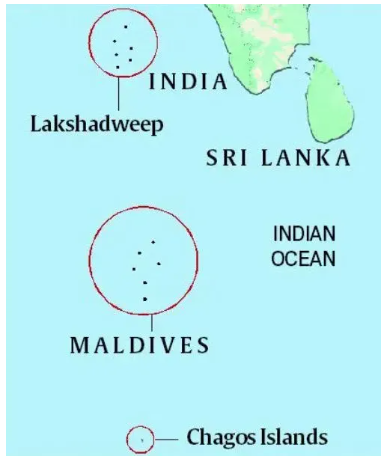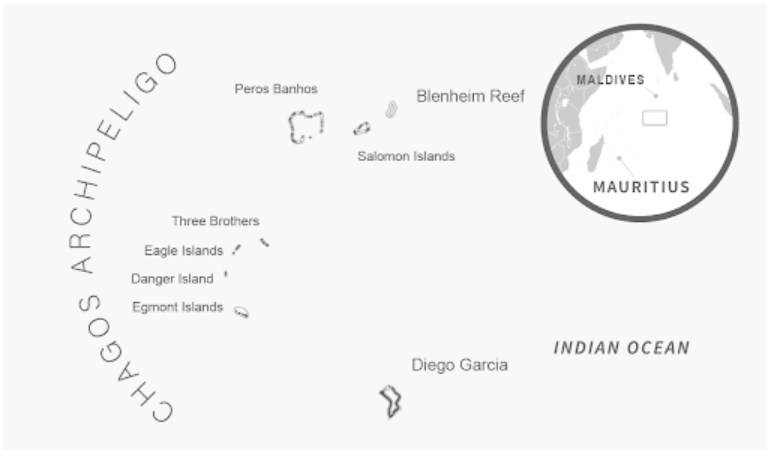24 October 2024 : Indian Express Editorial Analysis
1. INDIAN OCEAN CHURN
(Source: Indian Express; Section: The Editorial Page; Page: 10)
| Topic: GS2 – International Relations |
| Context: |
| The article discusses the UK’s decision to transfer sovereignty of the Chagos Archipelago to Mauritius, examining its geopolitical implications for regional power dynamics, particularly in the Indian Ocean, and its impact on India’s strategic interests. |
Chagos Islands
Geographical location

- The Chagos Archipelago is located in the central Indian Ocean, about 500 kilometers south of the Maldives and roughly 1,600 kilometers southwest of India.
- The Chagos archipelago comprises of 58 islands, with Diego Garcia being the largest and most significant.
About Diego Garcia

- The island has a strong U.S. military base, which plays a vital role in the US military operations in the Indian Ocean and beyond. This base is essential for intelligence, surveillance, and military logistics. The presence of U.S. forces strengthens security in the Indian Ocean region and helps maintain peace. The transfer of sovereignty raises several questions about the future of the military base.
- For India, the UK-Mauritius agreement offers an opportunity to strengthen its ties with Mauritius. The Islands are strategically located and India’s active involvement could help in maintaining a balance of power in the Indian Ocean.
The UK’s Decision to Transfer Sovereignty of the Chagos Archipelago
- The United Kingdom’s decision to transfer sovereignty of the Chagos Archipelago to Mauritius marks a watershed moment in international relations and maritime geopolitics.
- This long-standing issue, rooted in colonial legacies, has been a point of contention for decades. By resolving this dispute, the UK aims to address its colonial past while reshaping the power dynamics in the strategically important Indian Ocean.
- The transfer represents a shift in the balance of power in the region, with significant implications for maritime strategy and security.
Addressing Colonial Legacies and International Pressure
- The resolution of the Chagos issue came in response to growing international pressure on the UK.
- Key institutions like the International Court of Justice (ICJ) and the United Nations General Assembly (UNGA) called for decolonization, with several regional states, including India, advocating for the sovereignty of Mauritius.
- India, in particular, has been a vocal supporter of decolonization and a leader within the Global South.
- The UK’s decision to align with the international consensus likely reflects a pragmatic move to ease diplomatic tensions and uphold its global image under scrutiny.
Strategic Implications of the Sovereignty Transfer
- Although Mauritius gained sovereignty over the Chagos Archipelago, the agreement ensures that the US-UK military base on Diego Garcia remains under their control for 99 years.
- Strategically, this is significant for all parties involved. The military base, a critical asset for the US and UK, plays a key role in their operations in the Indian Ocean and beyond.
- For India, a major security provider in the region, this development has far-reaching consequences for its maritime strategy, autonomy, and regional alliances.
India’s Strategic Position in the Indian Ocean
- India’s close military ties with the US and the UK mean that Diego Garcia could provide a valuable forward base for Indian naval operations, including maritime patrolling, anti-piracy efforts, and intelligence gathering.
- As China’s naval presence in the Indian Ocean grows, India stands to benefit from enhanced logistical and military cooperation with the US to counterbalance Chinese expansion.
- However, India’s proximity to the US military facility raises concerns about its strategic autonomy.
Balancing Strategic Autonomy and Alliance with the West
- India has long adhered to a policy of strategic autonomy, avoiding alignment with any one bloc while engaging with multiple partners, including Russia, Iran, and other Middle Eastern nations.
- Deeper military cooperation with the US could be seen as a shift toward the West, potentially complicating India’s non-aligned stance.
- Diego Garcia is not only crucial for US operations in the Middle East but also serves as a hub for nuclear submarines, adding to the complexity of India’s position. Rising tensions in the region, such as the Iran-Israel conflict, could challenge India’s diplomatic balancing act, especially given its ties with both Tel Aviv and Tehran.
India’s Response to the Chagos Handover
- India played a behind-the-scenes role in encouraging the resolution of the Chagos dispute and is likely pleased with the outcome.
- However, despite welcoming the continued US control of Diego Garcia, India will likely project a balanced response.
- This reflects its broader strategic goal of avoiding overt alignment with the US-UK axis, thereby maintaining its independent position in the region.
Counterbalancing China’s Influence in the Indian Ocean
- China’s growing presence in the Indian Ocean, including its naval base in Djibouti and potential future bases in Pakistan, poses a significant challenge for India.
- As China seeks to expand its influence in the region, India will focus on countering Beijing’s strategic ambitions, particularly in the Western Indian Ocean.
- Despite having to manage expectations from regional states with close ties to China, India’s primary objective will be to safeguard its maritime interests and assert its role as a dominant power in the Indian Ocean.
India-Mauritius Relations and Maritime Security
- In addition to the broader geopolitical ramifications, India is mindful of Mauritius’ security needs. Mauritius will likely seek India’s assistance in building its maritime capacity, particularly in monitoring its Exclusive Economic Zone (EEZ) and addressing threats like illegal fishing.
- India’s concerns over Chinese encroachments in the region make it invested in strengthening Mauritius’ security capabilities.
- This partnership could help India protect its own interests while bolstering its image as a responsible and independent regional power in the Indian Ocean.
| Significance of Chagos |
|
Geostrategic Location: The archipelago’s location in the central Indian Ocean makes it strategically valuable for monitoring major shipping lanes, ensuring security in the region, and projecting military power across a wide area. UK-US Military Base: Diego Garcia, the largest island, hosts a major UK-US military base, which is crucial for operations in the Indian Ocean and surrounding regions. It serves as a logistics, surveillance, and intelligence hub for both the UK and the US, playing a key role in military operations in the Middle East, Africa, and South Asia. Environmental and Biodiversity Significance: The Chagos Archipelago is home to one of the largest coral atolls and is rich in marine biodiversity. Its pristine environment has made it important for scientific research and conservation efforts. |
| Practice Question: How does the UK’s decision to transfer sovereignty of the Chagos Archipelago to Mauritius impact geopolitical dynamics in the Indian Ocean, and what are the implications for India’s strategic interests and maritime security? (250 words/15 m) |
2. Learning& nation-building
(Source: Indian Express; Section: The Ideas Page; Page: 11)
| Topic: GS2 – Social Justice – Education |
| Context: |
| The article emphasizes the need for India’s universities to prioritize educating students on the Constitution’s values and its role in shaping national identity, social justice, and collective consciousness, particularly as the nation celebrates the 75th anniversary of its adoption. |
The Adoption of the Indian Constitution and India’s Post-Independence Reality
- The Indian Constitution, adopted on November 26, 1949, was a visionary document crafted by far-sighted framers. However, the socio-economic and educational conditions in India at the time were vastly different.
- India had a population of around 370 million, a high fertility rate, and an overwhelmingly young and illiterate population.
- With limited access to higher education — just 20 universities, 500 colleges, and a privileged elite attending them — the country’s education system was in its infancy.
- Fast-forward to the present, and India’s higher education landscape has expanded dramatically, with over 40 million students and more than 1.5 million faculty members, reflecting the country’s demographic and educational transformation.
The Role of Universities in Shaping Society and Value Systems
- In modern India, universities play a pivotal role in the nation’s social transformation, far beyond simply preparing students for jobs.
- With nearly half of India’s population under 25 and two-thirds born after economic liberalization, there is a need for a holistic approach to education.
- Focusing solely on STEM (Science, Technology, Engineering, and Mathematics) and medicine will not address the societal transformation that India requires.
- Universities must contribute to shaping well-rounded citizens by embedding constitutional values into their curricula and teaching. This education, which emphasizes the Constitution’s principles, should be provided in all Indian languages to create a more inclusive and informed citizenry.
The Constitution as a Source of Collective Consciousness
- The Indian Constitution is central to fostering a collective national identity. India’s complex socio-economic diversity, coupled with its non-classical federal structure, makes this collective consciousness essential.
- As the nation commemorates the 75th anniversary of its Constitution, universities have a critical role in nurturing this consciousness, promoting progressive nation-building ideas, and shielding society from sectarianism.
- The framers of the Constitution envisioned a pluralistic India, and it is imperative that universities instill this consciousness in the minds of young citizens.
Constitution as a Framework for National Identity
- The Indian Constitution has been instrumental in creating and expanding a unified national identity. Its provisions, particularly those in the Preamble, protect rights and freedoms while reflecting the pluralistic nature of the nation.
- Scholars like Alfred Stepan, Juan J. Linz, and Yogendra Yadav have emphasized the idea of “constitutional patriotism” as a unifying force in diverse societies.
- Universities must cultivate this “we-feeling” in students, helping them embrace a common national identity rooted in constitutional values, which is crucial for India’s continued nation-building process.
Celebrating Diversity through Constitutional Values
- The Constitution celebrates diversity, particularly through its principles of equality and non-discrimination. Universities, as microcosms of society, are ideal places to promote this diversity, not just as a concept but as a lived experience.
- By engaging with peers from varied backgrounds and studying the Constitution, students can develop a deeper understanding and appreciation for India’s cultural and social diversity.
- This inclusive approach can help build a more informed, enlightened, and empathetic citizenry.
The Constitution as an Instrument of Social and Political Empowerment
- One of the Constitution’s most significant achievements was the abolition of untouchability through Article 17, signaling a profound shift in India’s social order.
- The Constitution not only prohibited untouchability but made it an offense, underscoring the importance of liberty, equality, and fraternity. Universities are spaces where values are formed and transformed, making them the ideal setting to teach and uphold constitutional values.
- By promoting these values, higher education institutions can shape a generation of socially and politically empowered citizens.
Social Justice as a Core Constitutional Value
- The theme of social justice runs throughout the Indian Constitution, emphasizing its importance in shaping an equitable society. As India celebrates the 75th anniversary of its Constitution, the pursuit of social justice remains a critical goal.
- Universities must play a central role in realizing this constitutional project by institutionalizing these values in their education systems. Through transformative education, students can challenge existing societal structures and work toward achieving social justice, building a more egalitarian society in line with the Constitution’s vision.
Reimagining Universities in the Spirit of Constitutional Values
- As India commemorates 75 years of its Constitution, the country must reimagine its universities to focus on education and research aligned with the Constitution’s ideals.
- Higher education institutions should educate and empower the youth to appreciate the historical struggles that led to India’s freedom and the vision of the framers of the Constitution.
- This renewed focus on constitutional education will enable young Indians to contribute meaningfully to the ongoing project of building a vibrant and inclusive republic.
| PYQ: The quality of higher education in India requires major improvements to make it internationally competitive. Do you think that the entry of foreign educational institutions would help improve the quality of higher and technical education in the country? Discuss. (200 words/12.5m) (UPSC CSE (M) GS-2 2015) |
| Practice Question: How can India’s universities contribute to fostering constitutional values, national identity, and social justice, and why is this critical as the country celebrates the 75th anniversary of its Constitution? (250 words/15 m) |



